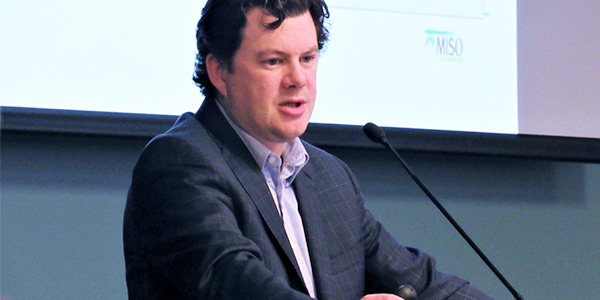By Amanda Durish Cook
MISO is wagering that proposed rule changes will cut down on the time and expenses spent evaluating transmission proposals and position it to assess multiple competitive projects in a single Transmission Expansion Plan (MTEP) cycle.
The RTO said Thursday that it will soon file with FERC to outline increased data requirements, page limits and tighter deadlines in its competitive developer selection process.
Stakeholders have repeatedly asked MISO to make the improvements.
MISO Senior Manager of Competitive Transmission Administration Brian Pedersen said the length of proposals grew sharply between the solicitation for the Duff-Coleman project — the RTO’s first competitive project — and the currently embattled Hartburg-Sabine project. (See Uncertainty Deepens for Hartburg-Sabine Project.) Developers vying for Duff-Coleman in 2016 on average attached about 85 files to their proposals, but the file attachments had grown to about 150 per proposal by the 2018 Hartburg-Sabine solicitation.
“We have good developers and they submit full proposals,” MISO design engineer Alex Monn said during a July 18 workshop on the competitive transmission process.
But the proposals might have been a bit too fleshed-out for planners, prompting MISO to propose setting a 125- to 300-page limit, depending on the size and complexity of the transmission project being bid on.
The RTO also wants to “right size” its evaluation time based on size and complexity and is proposing to spend no more than 240, 375 or 480 days on one developer selection. It said the three proposal windows will “match the right level of proposal preparation and evaluation resources to each project.” Pedersen said the idea is to trim timelines and evaluation efforts on smaller, more straightforward projects.
MISO’s Tariff currently allows a maximum 480 days to execute the developer selection process from MTEP approval to an executed selected developer agreement. The Duff-Coleman selection took nearly all that time, while Hartburg-Sabine took less than a year.
The RTO also said it will change rules so it can accept a smaller project evaluation deposit for simpler projects that won’t require as much review. The current deposit requirement is $100,000 per proposal. Accordingly, MISO is proposing to scale down its proposal submission windows to either 60, 120 or 165 days, also depending on project intricacy.
Multiple stakeholders said a 60-day window would not be enough time to put together project proposals.
“Sixty days is just not enough time. … I feel like 90 days would be the minimum,” Entergy’s Yarrow Etheredge said.
Pedersen said he would re-examine the smallest proposal window with his staff to make sure it’s a sufficient amount of time.
“Matching our level of effort with your level of effort is a good thing,” Pedersen said. “Just like you’re on the clock, we’re on the clock when the proposals come in.”
MISO is also adding requirements to ensure the information received from developers is more valuable in aiding selection. It would specifically ask for recent project success stories, more project cost breakdowns and calculations to support design decisions along with three years of financial data and company credit ratings.
Pedersen said MISO will still move ahead with improving the competitive bidding process despite FERC’s rejection of its proposed cost allocation for competitive projects last month. (See MISO Allocation Plan Fails on Local Project Treatment.)
“There is a future out there and we still need to plan. It’s better to be ready when it happens,” he said.
MISO plans to file the competitive process changes with FERC in mid-September, with a goal to enact the rules by December. The RTO will not have a competitive project process in 2019.





